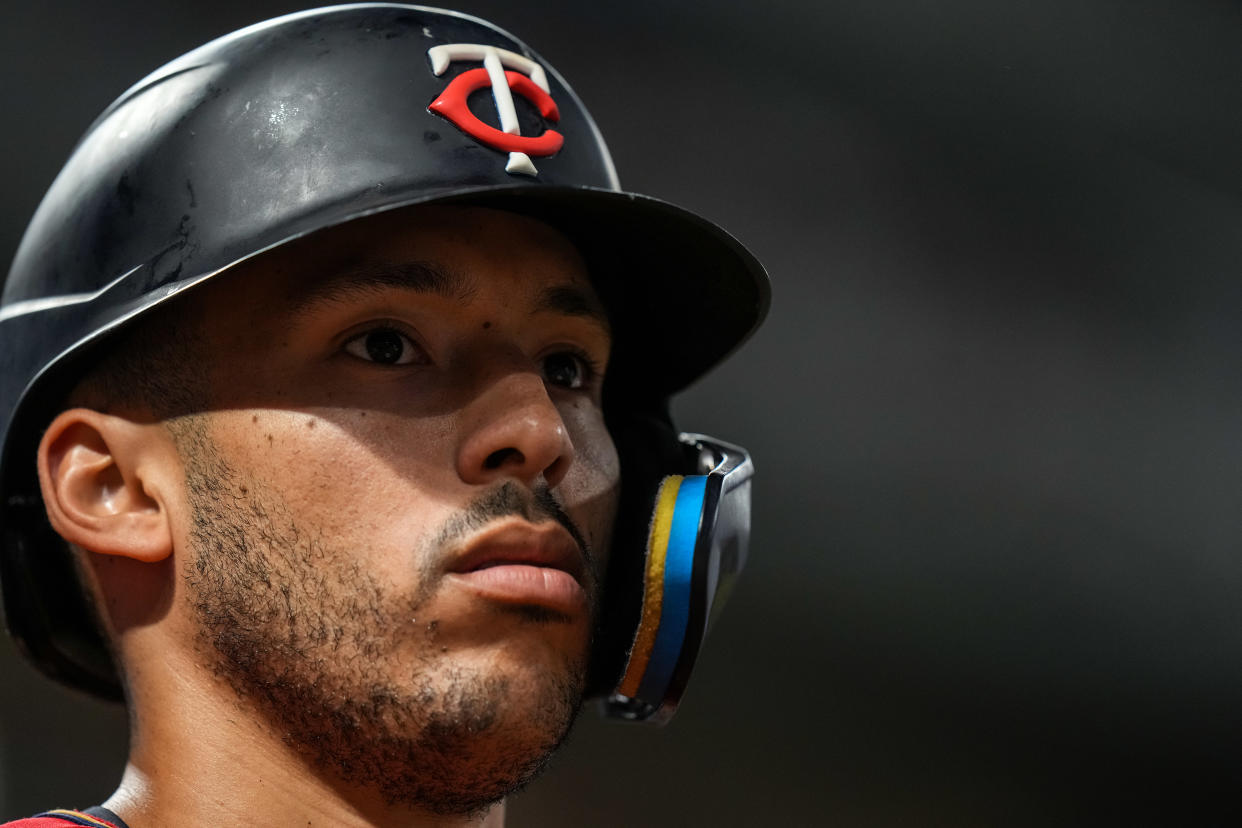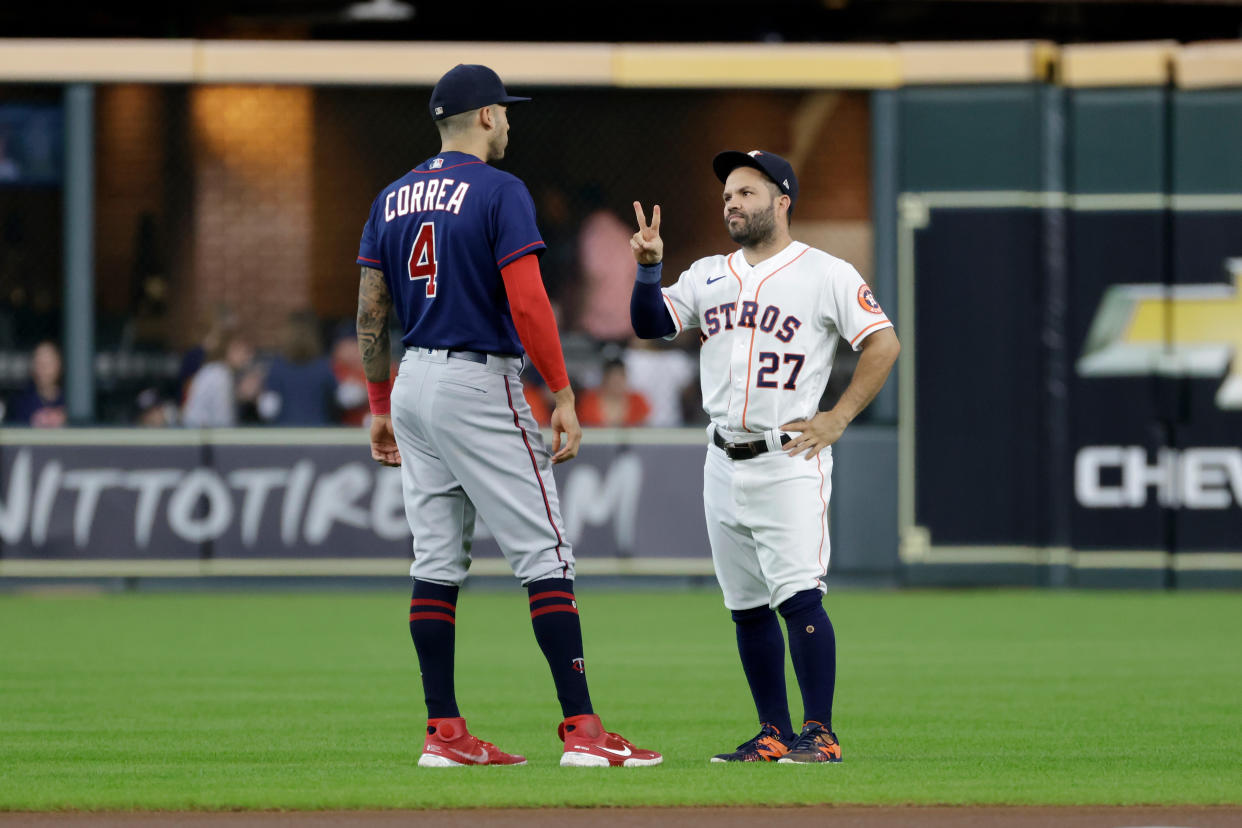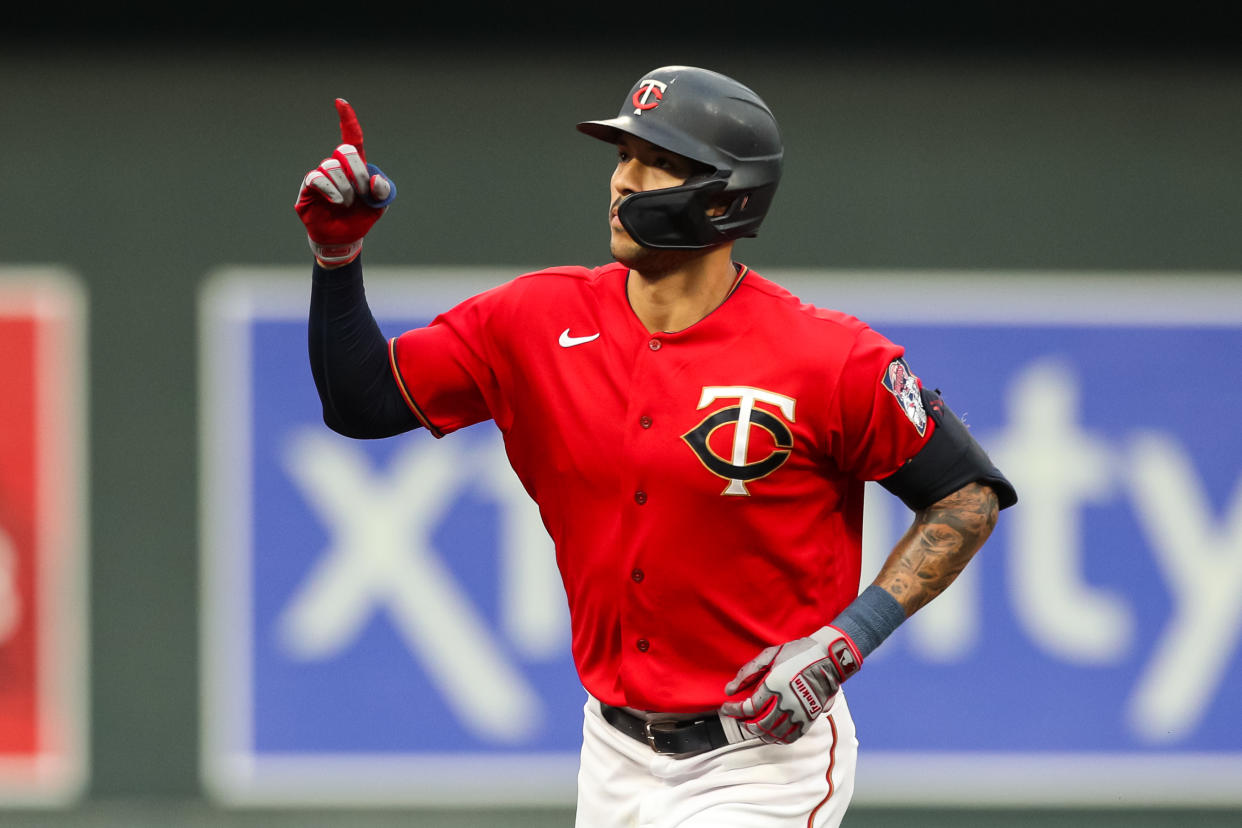'He has the highest standard of excellence': Inside Carlos Correa’s efforts to build a winning culture with the Twins
In the same news conference room where he talked about losing the World Series as a Houston Astro 295 days earlier, Carlos Correa talked about not being a Houston Astro anymore.
Game 6 had gone to Atlanta, and as the Braves players and their families littered Minute Maid Field with confetti, Correa had dutifully answered questions about the likelihood that he had just played his last game with the only organization he’d ever known.
That was last October, the end of Correa’s seventh season in Houston — his third trip to the World Series, sixth postseason. And it was, in fact, his final game with the Astros.
This past week, he returned to Houston — hardly for the first time, he owns a home there — as a visiting member of the Minnesota Twins. Before the first of a three-game Astros sweep, Correa addressed the media.
“It’s going to be pretty emotional,” he said of facing his former teammates in front of the Houston fans. “I don't know if I will cry. I'm not the type of guy that cries because of emotion.”
Elsewhere, his new teammates made the same joke over and over: Finally somewhere that they wouldn’t hear boos when Correa comes to bat.
In an effort to overcome their conspicuous postseason curse, the Twins enlisted the expensive, potentially fleeting, services of someone steeped in the kind of infamous October success that critics would say came at the expense of a deal with the devil. A last-place team in 2021, they stunned the sport in spring training by landing the top free agent with a player-friendly contract. Even from his introductory news conference at the Twins’ complex in Florida, it was clear: They could end up paying him to use the team as a springboard into a longer, more lucrative deal next offseason. But they were banking on Correa knowing more about winning than cheating, and the outsized influence a vocal leader can have on a talented clubhouse.

'One of the smartest baseball players'
After signing autographs from the field but before the ovation in his first at-bat, Correa stood alongside Astros third baseman Alex Bregman just behind second base on an otherwise empty field for the national anthem.
Fraternizing. pic.twitter.com/AVhyKsgMJA
— Hannah Keyser (@HannahRKeyser) August 24, 2022
“We were just talking baseball like old times,” Bregman said. “We were just talking about his swing and how we're feeling at the plate and any changes we're trying to make mechanically or anything we're trying to do differently. He's one of the smartest baseball players I've ever played with in my life — like he's super intelligent about all phases of the game — so I always love talking about the game with him.”
Correa’s intelligence is as much a part of his renown as his raw athleticism. It’s in his origin story: Lobbying his parents as an elementary schooler in Puerto Rico to send him to a bilingual private school so he could master English ahead of his intended future as a baseball star in America. And it’s evident in his deft deployment of advanced metrics when discussing his performance. If Correa cites a certain launch angle and exit velocity in casual conversation, he knows exactly what those numbers represent.
Baseball has become the ultimate thinking man’s sport, but there’s a stereotypical sense that the Ivy League nerds who now populate front offices often act in juxtaposition to the culture created in the clubhouse. Number crunchers and innovative liaisons between the coaching staff and the computers pull strings that have players on the other end.
But if you ask Correa what he was able to take from the Astros’ success to benefit the Twins, his answer starts simply and decisively: “Information.”
And then he talks about having the right mentality, playing for team wins and not personal stats. But he brings it back to the work done away from the field.
“The preparation right now here is off the charts,” Correa said. “Not only from the players but also from the coaching staff. I feel like we have a lot more information now than we did at the beginning of the year.”
He stops short of ascribing that development to his own personal impact. But Twins leadership has not been shy about crediting Correa with improving the organization around him. In that first Zoom meeting, hours before he signed with Minnesota, they were struck by his detailed analysis of what the team did well — and how they could be better. And that has been born out in the way he elevates everyone from his teammates to the coaches to the advanced scouts.
“He has the highest standard of excellence,” Twins manager Rocco Baldelli said. “You can't expect more out of yourself and out of your group than he does. And it rubs off on everyone, it even rubs off on me.”
Astros praise Correa's influence
In 2012 the Astros lost 107 games, Carlos Correa was the first overall pick in the draft, and Byron Buxton — the tantalizingly talented but chronically injury-limited centerfielder who has starred for the Twins whenever he’s on the field — was taken second overall.
That summer, Correa lived with Brett Phillips, the famously jovial outfielder who most recently played for the Baltimore Orioles, in rookie ball. Phillips, who was 18 and selected in the sixth round, remembers driving around the 17-year-old Correa — and being struck by his preternatural maturity.
Phillips’ mom had sent the kids — cause really that’s what they were at the time — a care package of candy. But when he opened it, Correa cautioned him against indulging.
“What are you doing bro, we can’t eat that,” Phillips remembers him saying. “We’re trying to be major leaguers.”
“I guess in today's age, people call it like he was manifesting it. But back then it was just work, work, baseball,” Lance McCullers Jr. said earlier this year.
McCullers was a member of that same Astros draft class, another first-rounder 40 picks behind Correa, and has been best friends with Correa ever since. By now, their friendship has spanned not only a decade but call-ups, championships, marriage and children. McCullers is the godfather of Correa’s son, Kylo, and last week presented Correa with his AL Championship ring from 2021.
It was a particularly meaningful moment for McCullers, who had struggled with his emotions when the remaining Astros had received their rings earlier in the season.
“I texted him and I was like, you know, ‘I usually don't view these things as important,’” he said.
McCullers, who was injured in the division series and missed the remainder of the playoffs, couldn’t help but wonder what the team might’ve accomplished if he’d stayed healthy.
“I felt like that was like our last chance to win a championship together, at least for this organization,” McCullers said. “And that made me really sad, the ring. But I also felt grateful for how many experiences that we had together, how many opportunities we had.”
In his first few years in the big leagues, Correa was more of your classic lead-by-example type. That’s how a lot of talented players are — creating expectations just through their own daily grind.
Then the sign-stealing bombshell dropped.
Spring training 2020 started out as an ill-fated apology tour for the Astros that gave way to a disruptive pandemic. Correa quickly emerged as one of the more eloquent voices of a team that everyone demanded to hear from, but no one really wanted to listen to. Strikingly, he spoke up not only when he was required to, but also sought out the media to put his face and his name on a story that made everyone involved look terrible. He didn’t try to deny the cheating.
“Carlos, he's an oldest brother,” McCullers said. “And when you're the oldest sibling, you have more of a protective mentality.”
Specifically, Correa wanted to defend José Altuve, who had won the MVP in the 2017 season that the Astros had employed the trash-can scheme but whom Correa insisted had never participated in the cheating himself.
“I can always live with being honest 100% all the time, but I can’t live with being quiet,” Correa said recently about why he was so vocal during that newscycle. “You do anything for your kids, you do anything for your brothers, you do anything for your parents and those were my brothers, they are my brothers in there. So I was just protecting my family.”

When George Springer, who had been a leader in the Astros clubhouse, left after that 2020 season, Correa assumed an even more vocal role. Bregman credits him, along with Martín Maldonado, for shaping the blossoming careers of their young, Latin pitching core. On the plane, when he and bench coach Joe Espada would plan for the upcoming series, their private conversations would turn into strategic symposiums as other players gathered around.
“Every time he stood up, he has this presence that everybody listens. And it was easy to follow him because he really wants to win. He knew what it takes to win. He left it all on the field,” Espada said. “When you have someone like that, you hand them the reins [and say], ‘Alright go get ‘em.’ And that's what we did.”
Success starts with preparation
These days, Correa’s uncompromising honesty comes in quieter settings, away from the critical spotlight in Houston. Recently, he told a teammate who had gained weight to consider the importance of defensive versatility on his eventual earning potential as a free agent.
“Just straight up like that,” Correa said, “And then I said, ‘Go talk to the strength coaches, go talk to a dietitian and get on that plan for you to get back in shape.’ He lost 10 pounds in like two weeks and he's playing great. It's how you have to be when you're trying to build something special.”
The Twins are a game and a half back in an AL Central division that will likely send only one team to the postseason. Perhaps because they didn’t turn into juggernauts overnight, Correa’s season has gone largely under the radar. But his wRC+ — one of his preferred stats for assessing performance that tells you a player’s relative contributions above or below league average — is 128, not as high as his best seasons in Houston, but in line with his career production.
All around Major League Baseball are case studies in the limited ability of a single player to sway the fortunes of their franchise. That’s only if you consider what happens between the lines. And for a stathead, Correa puts a lot of stock in intangibles.
“One person is not going to help you win a title just on pure performance on the field,” he said. “It’s what you do in the clubhouse that's gonna change your organization, change the culture.”
The real test of his influence won’t be seen publicly unless the Twins can sneak into the postseason. In 79 career playoff games across seven seasons Correa has done 45 times what the Twins have failed to do for nearly two decades: Win.
“That word will end up in your article probably not enough times,” Baldelli said. “It'll be in there a lot, but it should probably be in there one more time.”

Stay in Minnesota could be short-lived
This year might be their only chance to win together: Carlos Correa and the Minnesota Twins.
The contract he signed just six months ago is for three years and $105.3 million, but with opt-outs after each of the first two seasons. The expectation is, should he play well enough to command another sizable offer, Correa will re-enter the market this offseason and try his hand again at signing something that starts with a crooked number.
Of course, publicly right now, both sides profess happiness with the relationship. Correa talks only of being a Twin, he calls the losses of last year “ours,” is hopeful for what “we” can build in Minnesota with the young talent they have now, and laments not having had a full spring training to shape the culture.
“Everything was so rushed,” he said. “These guys are my family already.”
But above all else, Correa is clear-eyed. It takes a killer instinct to win in October and if he wasn’t hardened to the emotions of the game before this past offseason, he is now.
“I've always understood from the moment that I got signed and I started getting older, I always understood how the business worked and how you build a team and how you build a winning culture for a long time,” Correa said. So the biggest thing I've learned is, don't get too attached and don't let your feelings get involved.”
Try telling that to the people who have grown accustomed to his unwavering influence.
“I’m really hoping he does. I’m really hoping,” Baldelli said about whether he thinks Correa will stay in Minnesota.
“I'm planning on him being here next year, how’s that?”
